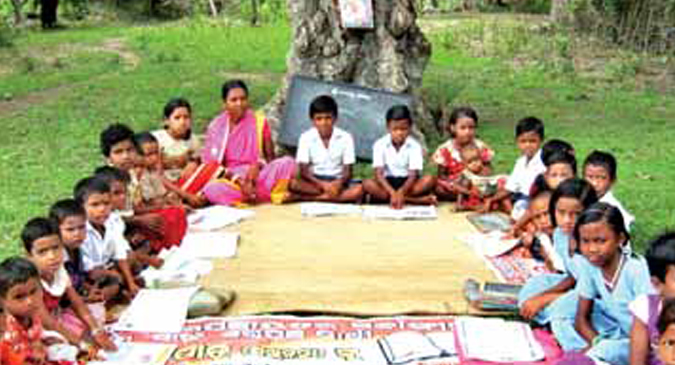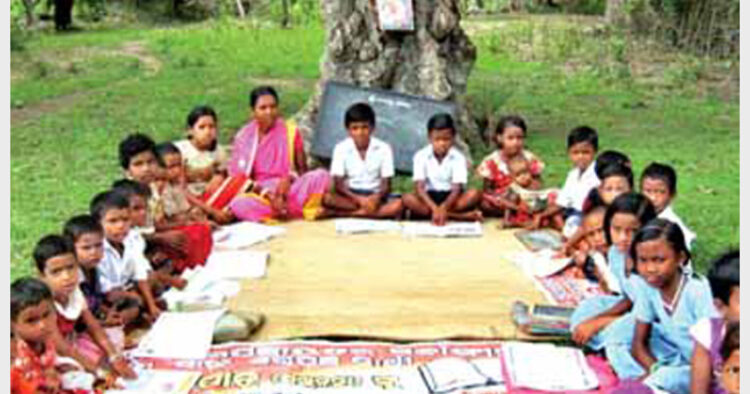As the name suggests, the model of operation of Ekal Foundation is single-teacher based school with the provision of one teacher for every school
Ekal Vidyalaya is a movement involved in integrated and holistic development of rural and tribal children in India and Nepal. Established in 1986 by Rakesh Popli, a US-returned Indian nuclear scientist, and his wife Rama Popli, the Ekal started the first single-teacher school in Gumla in Jharkhand (then part of Bihar). The movement was successful within two years and, in 1989, 60 single-teacher schools were started simultaneously in Dhanbad. By 1995–1996, the Foundation was running 1,200 schools in Jharkhand. In the 1990s, global support networks were established.

Ekal Abhiyan Trust has been selected for Gandhi Peace Award-2017 for its contribution in providing education for rural and tribal children in remote areas pan India, rural empowerment, gender and social equality.
Congratulating the Trust, Prime Minister Shri Narendra Modi said, “Education is a strong means to empowerment and Ekal Abhiyan Trust is working in remote areas, so that children from tribal families get the opportunity to study. Their role in furthering women empowerment is laudatory. Congratulations to them for the Gandhi Peace Prize, 2017.”
The year 2018 witnessed growth rate of over 20%. The Single Teacher Schools grew from 55,646 to 68,348 (+23%), number of mobile digital labs ‘increased from 3 to 10 (+233%), no. of Mobile Sanskar Raths increased from 25 to 30 (20%) and Satellite Skill Centers from zero to fourThe main activity undertaken in this movement is to run one-teacher schools (known as Ekal Vidyalayas) all over India, in the remotest rural and tribal villages to take the education to every child. The overriding philosophy of Ekal Vidyalaya Movement is to take a holistic approach of social and economic development to Tribal and Rural India and Nepal. As the name suggests, the model of operation of the Foundation is a single-teacher based school, with the provision of one teacher for every school.
With the participation of numerous trusts and non-profit organisations, the movement has become the largest grass roots level non-governmental education and development movement that operates in the remote villages of India and Nepal. The Ekal movement aims to help eradicate illiteracy from rural and tribal India and Nepal following the philosophy of rural development based on the criteria of equality and inclusiveness across all the sections of the society.
Presently, Ekal Vidyalaya is a movement of over 79,498 teachers, 6,000 voluntary workers, 35 field organisations (throughout 22 states), and 8 support agencies. It operates in over 79,498 schools and educates more than 2 million
children.
Operational Organisations of Ekal Abhiyan
- Friends of Tribals Society
- Ekal Vidyalaya Foundation of India
- Bharat Lok Shiksha Parishad
- Cultural Society for Tribal
- Ekal Gramothan Foundation
- Arogya Foundation of India
- Ekal Sansthan
Apart from its goal of achieving the national standards of Minimum Level of Learning, Ekal Vidyalaya seeks to empower the village community for its own self-development through five verticals of Functional Education, Healthcare Education, Development Education, Empowerment Education and Ethics and Value Education. Ekal Vidyalaya’s goal is to nearly double the current number of schools to 100,000, providing education to over 3 million children. The dedication of the donors, supporters, and fulltime Sevavrati volunteers of Ekal Vidyalaya is the key to this Movement’s remarkable success.
According to its annual Report, the year 2018 witnessed a growth rate of over 20% on an average basis across activities. The One Teacher Schools grew from 55,646 to 68,348 (+23%), no. of mobile digital labs ‘Ekal on Wheels’ in field increased from 3 to 10 (+233%), no. of Mobile Sanskar Rath increased from 25 to 30 (20%) and Satellite Skill Centers from nil to 4. It was health intervention only which grew at a relatively slower pace of 7%, from 870 villages to 930 villages. The overall growth has thus been satisfactory and the rate is considered a pacesetter for the next couple of years, on the way to realise the goal. During the year the activities on empowerment and awareness gained significant push through Gram Swaraj Manch in selected regions.
The initiative towards digitalising Ekal education through ‘E-Shiksha’ made during 2018 in selected 180 villages in 4 states is noteworthy in this direction. The supporting agencies also stepped in this year through introducing their own supervision mechanism whereby they have started strengthening Samiti working of support and supervision. This was sought to be achieved through appointing ‘Anchal Prabhari’, a dedicated senior volunteer for each Anchal. These measures in aggregate would enhance the efficiency and output of operating efforts.













Comments